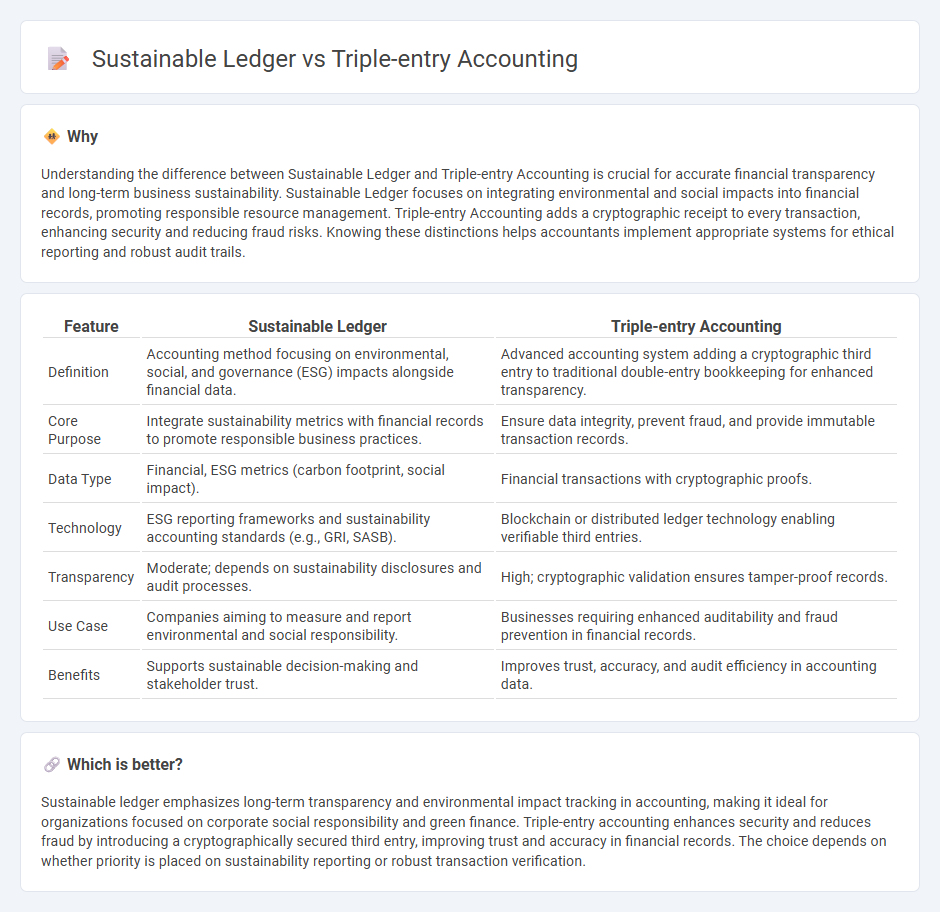
Sustainable ledger systems focus on integrating environmental, social, and governance (ESG) metrics into traditional accounting frameworks to promote transparency and long-term value creation. Triple-entry accounting introduces a cryptographic third record that independently verifies transactions, enhancing accuracy and fraud prevention in financial reporting. Explore how these innovative approaches redefine accountability and trust in modern accounting practices.
Why it is important
Understanding the difference between Sustainable Ledger and Triple-entry Accounting is crucial for accurate financial transparency and long-term business sustainability. Sustainable Ledger focuses on integrating environmental and social impacts into financial records, promoting responsible resource management. Triple-entry Accounting adds a cryptographic receipt to every transaction, enhancing security and reducing fraud risks. Knowing these distinctions helps accountants implement appropriate systems for ethical reporting and robust audit trails.
Comparison Table
| Feature | Sustainable Ledger | Triple-entry Accounting |
|---|---|---|
| Definition | Accounting method focusing on environmental, social, and governance (ESG) impacts alongside financial data. | Advanced accounting system adding a cryptographic third entry to traditional double-entry bookkeeping for enhanced transparency. |
| Core Purpose | Integrate sustainability metrics with financial records to promote responsible business practices. | Ensure data integrity, prevent fraud, and provide immutable transaction records. |
| Data Type | Financial, ESG metrics (carbon footprint, social impact). | Financial transactions with cryptographic proofs. |
| Technology | ESG reporting frameworks and sustainability accounting standards (e.g., GRI, SASB). | Blockchain or distributed ledger technology enabling verifiable third entries. |
| Transparency | Moderate; depends on sustainability disclosures and audit processes. | High; cryptographic validation ensures tamper-proof records. |
| Use Case | Companies aiming to measure and report environmental and social responsibility. | Businesses requiring enhanced auditability and fraud prevention in financial records. |
| Benefits | Supports sustainable decision-making and stakeholder trust. | Improves trust, accuracy, and audit efficiency in accounting data. |
Which is better?
Sustainable ledger emphasizes long-term transparency and environmental impact tracking in accounting, making it ideal for organizations focused on corporate social responsibility and green finance. Triple-entry accounting enhances security and reduces fraud by introducing a cryptographically secured third entry, improving trust and accuracy in financial records. The choice depends on whether priority is placed on sustainability reporting or robust transaction verification.
Connection
Sustainable ledger systems integrate environmental and social impact data directly into financial records, enhancing transparency and accountability in accounting practices. Triple-entry accounting extends traditional double-entry bookkeeping by adding a cryptographic receipt as a third entry, which ensures data integrity and simplifies audit trails. Together, these innovations support more reliable and eco-conscious financial reporting aligned with sustainability goals.
Key Terms
Cryptographic Receipts
Triple-entry accounting enhances traditional double-entry bookkeeping by integrating cryptographic receipts, creating an immutable ledger that fosters transparency and trust in financial transactions. Sustainable ledger technology further builds on this by incorporating environmental and social impact metrics directly into the cryptographic proofs, enabling organizations to track and audit sustainability claims with verifiable data. Explore how cryptographic receipts revolutionize accountability in financial and sustainability reporting for deeper insights.
Blockchain
Triple-entry accounting enhances traditional double-entry bookkeeping by incorporating a cryptographic receipt recorded on a blockchain, ensuring transparency and immutability of transactions. Sustainable ledgers extend this concept by integrating environmental, social, and governance (ESG) metrics directly into blockchain-based accounting systems to promote corporate responsibility and long-term sustainability. Explore how combining triple-entry accounting with sustainable ledger technology revolutionizes financial reporting and accountability.
Environmental Impact Tracking
Triple-entry accounting enhances transparency by adding a cryptographic proof to traditional double-entry bookkeeping, enabling real-time verification of financial data. Sustainable ledgers integrate environmental impact metrics directly into accounting systems, allowing companies to track carbon emissions, resource usage, and sustainability goals alongside financial performance. Explore the evolving technologies transforming environmental impact tracking in financial records to drive corporate sustainability.
Source and External Links
Triple entry accounting. Example and benefits - This article discusses the concept of triple-entry accounting using blockchain, enhancing trust and transparency by creating immutable records accessible to all parties involved.
Triple entry accounting - This webpage explains that triple-entry accounting introduces a third, immutable entry made on a blockchain, enhancing transparency and auditability compared to traditional double-entry systems.
Triple Entry Accounting - This paper integrates financial cryptography with double-entry bookkeeping by using digitally signed receipts as a third entry, improving the reliability of accounting records.
 dowidth.com
dowidth.com